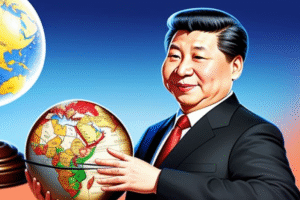$GOV $MNA #MergersAndAcquisitions #WhiteHouse #USPolitics #FinancialMarkets #EconomicImpact #GovernmentRole #InvestmentTrends #BusinessStrategy #MarketAnalysis
Who’s Driving the Surge in U.S. M&A Activity and Why It Matters to You?
In the current financial landscape, the U.S. government appears to be playing a pivotal role, reminiscent of a strategic player in a complex game of influence and power, aggressively engaging in mergers and acquisitions (M&A). This proactive stance by the government is reshaping the market dynamics and could have significant implications for investors and the economy at large.
Understanding the Government’s Role in M&A
Typically, M&A activity is driven by private corporations seeking to enhance their competitive edge, expand their market share, or capitalize on synergies. However, recent trends indicate a unique twist in the narrative with the U.S. government emerging as a key player. This shift is fueled by strategic economic policies aimed at reinforcing national interests, which include securing supply chains and advancing technological leadership in critical areas such as semiconductors and AI.
What This Means for the Market and Investors
The involvement of the government in M&A activities introduces a layer of complexity for investors. On one hand, these moves can stabilize sectors deemed vital for national security and economic sustainability. On the other hand, they can skew traditional market dynamics, potentially creating new winners and losers in the investment world.
The Strategic Implications of Government-led M&A
From a strategic perspective, the government’s involvement in M&A could be seen as a double-edged sword. While it enhances control over essential industries, it also raises questions about market fairness and competition. Investors and market analysts must now navigate not only financial metrics and corporate performance but also political and policy-driven influences when making investment decisions.
How to Adapt Investment Strategies
For investors, adapting to this new reality means enhancing due diligence and incorporating geopolitical risk assessment into their investment process. It’s no longer just about the financial health of a company but also about understanding how government actions could impact the sector in which that company operates.
The Broader Economic Impact
Beyond the investment implications, the surge in government-driven M&A activity also points to broader economic themes. It underscores the government’s role in shaping economic priorities and highlights the potential shifts in how economic power is distributed both domestically and globally.
Navigating the Future of M&A
As the landscape of M&A evolves with significant government involvement, stakeholders from CEOs to individual investors must recalibrate their strategies to align with this new paradigm. The intersection of government policy and corporate strategy will likely redefine the pathways to value creation and market growth in the coming years.
In conclusion, the increased M&A activity led by the U.S. government is not just a fleeting trend but a reflection of deeper economic and strategic shifts. Understanding these dynamics is crucial for anyone involved in the financial markets, from policy makers to investors. As we continue to witness these changes, staying informed and agile will be key to navigating this new terrain.
For further insights into how these trends are shaping the stock market, visit our dedicated stock news section.











Comments are closed.